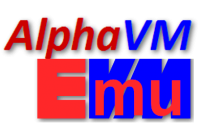Alpha systems that run in the factories and offices are old now. Many of them are used for critical tasks. The risk of failure increases with the flow of time. The support and maintenance are expensive. There are the following main ways to solve the problem:
- Migrate to a virtual Alpha system using virtualization software like AlphaVM
- Purchase a refurbished Alpha system to replace the existing Alpha system.
- Port the applications software to run on modern hardware and supported operating system (Windows, Linux).
- Write the software for modern hardware and OS from scratch.
The software porting approach is not always possible or feasible because the source code must be available, the costs are really high and there are many risks that the result will not be as expected.
Writing the software from scratch is even more expensive and risky. Still, this approach will deliver new native application software. The porting/rewriting projects tend to take long time, often longer than expected. AlphaVM can be uses as a fallback or a temporary solution to reduce the risks and/or the costs during the software rewriting or porting.
A refurbished system looks to be the cheapest and the least intrusive solution that will guarantee that the software works as before. However, there are perhaps some not so obvious problems with it. This approach does not actually solve the problem, because you are sill left with old hardware, which is prone to the same problems as the original hardware. At best, this approch just postpones the disaster. Also the support & maintenance costs for the refurbished hardware are likely to be similar to the costs of the original hardware.
The virtualization solution completely gets rid of the old Alpha hardware. The host hardware can be replaced without changes in the virtual appliance. The intrusion at the migration time is minimal. Only some tuning of the guest OS (OpenVMS, Tru64) might be required: rebuilding the kernel, renaming the disks etc. The risks are low, because the software is unchanged. It can be tested before the actual commissioning that the solution works for a specific customer project.
We believe that the virtualization solution is optimal with respect to risks, costs and efforts.
AlphaVM migration costs are made up from the following. One-off costs:
- Costs associated with the purchasing of the host hardware.
- Costs of the host OS license
- Costs of the OpenVMS or Tru64 transfer licenses required by HP when moving from hardware to a VM.
- AlphaVM license fee.
- Fee that we charge for performing the migration.
The periodic costs are associated with the support & maintenance of
- The host hardware and OS
- The guest OS and layered products
- AlphaVM (optional)
The actual costs depend on the specific Alpha hardware and other requirements and parameters. Please contact us to get the details.
